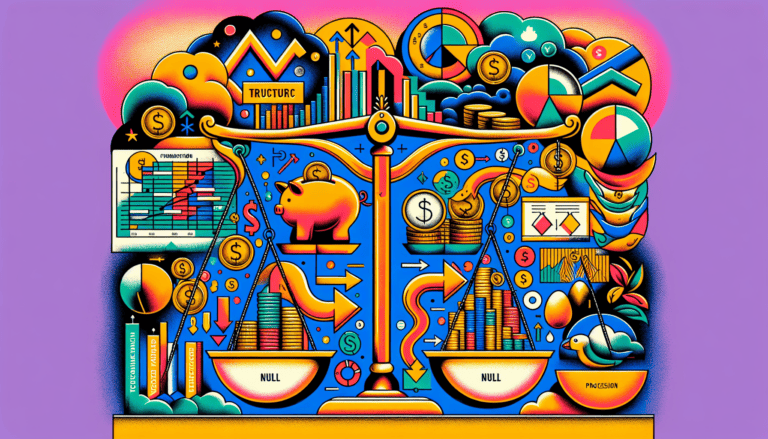Unlocking the Power of Stability: Exploring Certificates of Deposit (CDs) and Money Market Instruments

Introduction to Financial Instruments
Financial instruments are tools that individuals and organizations can use to manage their finances, invest funds, and secure their economic futures. Among these instruments, certificates of deposit (CDs) and money market instruments stand out as popular choices for beginner investors due to their relative safety and predictability.
Defining Certificates of Deposit
Certificates of deposit (CDs) are time deposits offered by banks and credit unions. Investors deposit a sum of money for a fixed period, which can range from a few months to several years. During this term, CDs earn interest at either a fixed or variable rate, typically higher than traditional savings accounts. Chase outlines that CDs are often chosen for their higher earnings potential over savings accounts, with the trade-off being limited access to funds until the CD matures. Early withdrawal of funds from a CD usually incurs penalties, which can negate some of the interest earnings.
CDs suit conservative investors who are willing to lock in their funds for a set period to earn a predictable return, as noted by Investopedia. The fixed nature of CDs means that the interest rate is determined at the start and does not change, providing investors with a guaranteed return on their investment.
Understanding Money Market Instruments
Money market instruments, on the other hand, are short-term debt securities that provide investors with a highly liquid investment option. These instruments include Treasury bills, commercial paper, municipal notes, and repurchase agreements, among others. They are typically considered safe investments due to their short maturities and high credit quality, as Investopedia describes.
Money market accounts, similar to savings accounts, offer some checking features as well. These accounts allow investors to write checks and use debit cards, which makes them more liquid than CDs. Money market accounts typically offer interest rates higher than savings accounts but lower than CDs, making them a compromise between earning potential and accessibility of funds, as Chase explains.
Investors may choose money market instruments for their liquidity and stability, especially if they require regular access to their funds or wish to take advantage of short-term interest rate movements. Money market instruments can also be part of a diversified investment strategy, balancing the higher interest rates of CDs with the liquidity of money market accounts, as suggested by NerdWallet.
For beginner investors looking to delve deeper into financial markets, understanding the nuances of these instruments is crucial. Exploring other financial instruments, such as bonds, equity securities, and foreign exchange instruments, will further enhance their investment knowledge and capabilities.
Safety and Security Measures
When investing in financial products like certificates of deposit (CDs) and money market instruments, safety and security are paramount concerns. Both of these investment avenues offer certain measures to protect investors’ capital, which we will explore in this section.
FDIC Insurance for Investors
One of the key safety features for deposit accounts, including CDs and money market accounts, is the insurance coverage provided by the Federal Deposit Insurance Corporation (FDIC). This government-backed insurance protects investors’ funds up to $250,000 per account holder in the event of a bank failure. Both types of accounts are covered by this insurance, giving investors peace of mind knowing that their capital is secure up to the insured amount (Investopedia).
For those with funds exceeding the FDIC-insured limit, it’s important to spread the capital across different financial institutions or account types to ensure maximum coverage. This strategy can be particularly useful for those looking to maintain higher levels of liquidity while still benefiting from the security that FDIC insurance provides.
Assessing Investment Risks
While CDs and money market instruments are generally considered low-risk investments, it’s crucial for investors to assess the risks associated with them. Here are some considerations:
-
CDs: The primary risk with CDs is the lack of liquidity. Since CDs have fixed terms, accessing funds before maturity can result in penalties for early withdrawal. This could be a significant disadvantage if investors need quick access to their funds due to unforeseen circumstances (Forbes).
-
Money Market Accounts: Money market accounts offer more flexibility with limited check-writing capabilities and an ATM card, but they come with variable interest rates. This means that the returns may fluctuate with market conditions, which can impact the final yield on your investment (Investopedia).
Investors should carefully consider how quickly they might need access to their funds, their financial goals, and their risk tolerance when determining which investment is most appropriate for their needs. Understanding your investment timeline and the potential need for liquidity will guide you in choosing between a CD and a money market account.
| Investment Type | FDIC Insured | Liquidity | Interest Rate Type |
|---|---|---|---|
| CD | Up to $250,000 | Limited (penalties for early withdrawal) | Fixed |
| Money Market Account | Up to $250,000 | High (limited check-writing capabilities) | Variable |
Whether you are leaning towards the guaranteed returns of CDs or the liquidity and potentially higher returns of money market accounts, it’s essential to evaluate all available investment options to find the best fit for your financial situation and goals. Remember to diversify your investment portfolio to manage risk effectively, and keep abreast of market conditions to make informed decisions.
Interest Rates and Returns
When considering certificates of deposit (CDs) and money market instruments, interest rates and the resulting returns are critical factors for beginner investors to understand. These rates are the primary influencers of the potential gains from these financial instruments.
Comparing Interest Rates
Certificates of Deposit (CDs) typically offer a fixed interest rate over a specified term, which can range from a few months to several years. Generally, the longer the term of the CD, the higher the interest rate and, consequently, the return on investment. On the other hand, money market instruments often provide variable interest rates, which means the rate can fluctuate based on market conditions.
Here’s a simplified comparison of the interest rates for CDs and money market accounts based on current market data:
| Financial Instrument | Interest Rate Type | Average Rate |
|---|---|---|
| Certificate of Deposit (1-year term) | Fixed | 0.50% |
| Certificate of Deposit (5-year term) | Fixed | 1.50% |
| Money Market Account | Variable | 0.30% – 0.60% |
Data sourced from Bank of America and Investopedia.
Investors should weigh liquidity and risk factors when choosing between CDs and money market instruments based on their financial goals and needs. While CDs are secured by the issuing bank’s assets, making them less risky, money market instruments are typically unsecured and carry a slightly higher risk (Investopedia).
Fixed vs. Variable Rates
CDs often come with fixed interest rates, ensuring a predictable return. Investors appreciate this predictability, as it allows them to plan their finances with a more concrete understanding of what they will earn by the investment’s end.
Conversely, money market accounts offer variable interest rates, which can increase or decrease depending on the economic landscape. This variability means that the returns on money market accounts can potentially be higher than those on CDs during periods of rising interest rates. However, the opposite is also true; returns can decrease if rates fall.
Understanding the differences between fixed and variable rates is key to making informed decisions:
-
Fixed Rates – These rates do not change over the life of the investment. They offer stability and predictability, making them suitable for conservative investors or those with a clear savings goal within a specific timeframe.
-
Variable Rates – These rates can fluctuate with market conditions, offering the potential for higher returns but also increased risk. They can be more suitable for investors who have more flexibility and are willing to take on additional risk for the possibility of higher gains.
Both CDs and money market accounts have their own set of advantages and considerations when it comes to liquidity. Money market accounts usually come with limited check-writing capabilities, an ATM card, or both, allowing easier access to funds compared to CDs, which typically require waiting until the end of the term for full access without penalties for early withdrawal (Forbes).
As you explore the different aspects of financial markets, remember to also consider other investment options such as foreign exchange instruments, equity securities, derivative contracts, and exchange-traded funds (ETFs) to diversify your portfolio and potentially enhance your investment returns.
Accessing Your Investment
Understanding how to access your investment is crucial when dealing with financial instruments such as certificates of deposit (CDs) and money market instruments. These vehicles offer varying degrees of liquidity and can be tailored to align with one’s financial goals.
Liquidity and Financial Goals
Liquidity refers to how quickly and easily an investment can be converted into cash without significant loss in value. Money market accounts are known for their liquidity compared to CDs. With features like limited check-writing capabilities and ATM cards, money market accounts offer easier access to funds, which can be advantageous for investors who may need to tap into their savings more readily (Chase). This makes them an attractive option for those looking to maintain a balance between earning interest and having funds available for unexpected expenses or short-term needs.
On the other hand, CDs typically lock in funds for a set period, ranging from a few months to several years, which can align well with long-term financial goals that do not require immediate liquidity. The following table outlines the liquidity features of both investment options:
| Investment Type | Liquidity Features |
|---|---|
| Money Market Accounts | ATM access, limited check-writing |
| Certificates of Deposit (CDs) | Funds locked until maturity date |
For more detailed insights into how these accounts function, investors can explore money market accounts and compare them with other financial instruments, such as bonds and savings accounts.
Penalties for Early Withdrawal
While CDs offer higher interest rates compared to traditional savings accounts, they come with a significant caveat—penalties for early withdrawal. If an investor needs to access their CD funds before the maturity date, they may face a penalty that could include a loss of interest earned or even a portion of the principal amount. The specific terms vary by institution and the length of the CD term.
For example, with a one-year CD, an early withdrawal penalty might equate to three months’ worth of interest, while a five-year CD might incur a penalty of up to twelve months’ interest or more. It’s essential for investors to understand these potential costs and consider them when choosing between CDs and more liquid options like money market accounts, which generally do not impose such penalties for withdrawals (Forbes).
Investors should carefully assess their need for liquidity against the potential returns and penalties associated with CDs and money market accounts. By doing so, they can select the most suitable investment that aligns with their financial objectives and risk tolerance. For further information on managing investments and understanding financial markets, beginner investors may also explore resources on foreign exchange instruments, equity securities, and derivative contracts.
Investment Horizons and Strategies
Understanding investment horizons and developing strategies are pivotal steps for beginner investors to navigate through the various financial instruments available. This section will compare short-term versus long-term investments and explain the importance of diversifying one’s portfolio, especially when considering certificates of deposit (CDs) and money market instruments.
Short-Term vs. Long-Term Investments
The choice between short-term and long-term investments should align with the investor’s financial goals and timelines. Money market instruments, such as money market accounts, are typically associated with short-term saving goals like emergency funds or interim savings for a larger purchase. They offer a lower-risk investment option with slightly higher interest rates compared to traditional savings accounts, providing liquidity and ease of access (Forbes).
In contrast, certificates of deposit (CDs) are more suited for investors with a longer investment horizon. They often offer higher interest rates than money market accounts, but require the investor to commit their funds for a specific period, with penalties for early withdrawal. The longer the term of the CD, the higher the potential return, aligning with long-term financial objectives such as retirement savings or future educational expenses (Investopedia).
| Investment Type | Horizon | Liquidity | Interest Rates | Risk Level |
|---|---|---|---|---|
| Money Market Accounts | Short-Term | High | Slightly higher than savings | Low |
| Certificates of Deposit (CDs) | Long-Term | Low (without penalty) | Higher, fixed or variable | Low to Moderate |
Diversifying Your Portfolio
Diversification is a strategy that involves spreading investments across various financial instruments to reduce risk. Including both money market accounts and CDs in a savings strategy allows for a mix of liquidity and higher interest rates, tailored for different financial needs and timelines (NerdWallet).
For instance, an investor may choose to allocate funds to a money market account for immediate or near-future needs, while simultaneously investing in CDs with different maturity dates to benefit from higher, fixed interest rates and to plan for long-term goals. This approach not only hedges against market volatility but also ensures that some funds are readily accessible if needed.
Investors should also consider incorporating other financial instruments, such as bonds: government vs. corporate, exchange-traded funds (etfs) explained, and mutual funds and their mechanisms, to achieve a well-rounded and robust investment portfolio. Furthermore, exploring options like real estate investment trusts (reits) and cryptocurrency and digital assets can add layers of diversification, catering to different risk tolerances and investment horizons.
In conclusion, selecting the right mix of financial instruments, including certificates of deposit (cds) and money market instruments, depends on the investor’s unique financial situation, goals, and risk appetite. By evaluating these factors, beginner investors can make informed decisions and craft a diversified investment strategy that aligns with their long-term financial vision.
Navigating Market Conditions
Investors should be acutely aware of how changing market conditions, including inflation and economic shifts, can impact financial instruments like certificates of deposit (CDs) and money market instruments. Understanding these effects is vital to adjust strategies accordingly.
Impact of Inflation on Investments
Inflation is a significant economic factor that affects the value of financial instruments. For fixed-income investments such as CDs and money market instruments, inflation can be a double-edged sword. During periods of rising inflation, the real interest rate— which is the nominal interest rate adjusted for inflation—can become negative. This scenario leads to a decrease in the purchasing power of the investment returns (Investopedia).
| Financial Instrument | Nominal Interest Rate | Adjusted Real Interest Rate (Inflation 3%) |
|---|---|---|
| Certificate of Deposit (CD) | 2% | -1% |
| Money Market Fund | 1.5% | -1.5% |
As the table illustrates, if the nominal interest rates of CDs and money market funds do not outpace inflation, the real interest rate can turn negative, meaning that the value of the returns does not keep up with the increasing cost of goods and services.
Adjusting Strategies in Changing Markets
To mitigate the impact of inflation on investment returns, investors need to consider adjusting their strategies. While CDs and money market instruments are applauded for their safety and stability, they may not always offer returns that outpace inflation, especially during periods of rising prices.
Investors may diversify their portfolios by incorporating a blend of assets such as equities, commodities, and Treasury Inflation-Protected Securities (TIPS) to hedge against inflation. These assets often have the potential to provide higher returns in an inflationary environment, balancing out the more conservative investments.
For those looking to explore various investment options beyond the traditional scope, the following resources can provide further insights into the diverse world of financial instruments:
- Foreign exchange instruments
- Exchange-traded funds (ETFs) explained
- Cryptocurrency and digital assets
- Real estate investment trusts (REITs)
- Hedge funds and their strategies
By analyzing financial needs and evaluating investment options, investors can tailor their portfolios to better withstand the ebb and flow of market conditions, ensuring their investments are well-positioned to achieve their financial goals, regardless of economic fluctuations.
Choosing the Right Option
Investing in the right financial instrument is a critical decision for beginner investors. When considering certificates of deposit (CDs) and money market instruments, it’s essential to analyze personal financial needs and evaluate the characteristics of each option to determine the best fit for one’s investment strategy.
Analyzing Financial Needs
Before diving into investment options like CDs or money market accounts, investors should first consider their financial objectives. This includes understanding their time horizon, liquidity requirements, and tolerance for risk. For instance, individuals looking for a safe place to park their funds for a known period without needing immediate access may find CDs appealing due to their fixed terms and guaranteed returns.
On the other hand, those who prioritize flexibility and may require access to their funds on short notice might lean towards money market accounts. These accounts typically offer limited check-writing capabilities and an ATM card, allowing easier access to funds compared to CDs, which usually penalize early withdrawals (Forbes).
Evaluating Investment Options
When evaluating certificates of deposit (CDs) and money market instruments, it’s crucial to compare their features side by side:
| Feature | Certificate of Deposit (CD) | Money Market Account |
|---|---|---|
| Interest Rates | Generally fixed | Usually higher and variable |
| Access to Funds | Penalty for early withdrawal | Limited check-writing and ATM access |
| Investment Terms | Fixed (ranging from a few months to several years) | Flexible |
| Risk | Low | Low |
After considering the table above, investors should align their choice with their financial goals. For example, if one’s goal is to save for a down payment on a house in two years, a CD with a matching term might be suitable. Conversely, if the goal is to maintain an emergency fund that is readily accessible, a money market account would be more appropriate.
It’s also important to consider how these options fit into a broader investment strategy. For instance, incorporating CDs or money market accounts into a diversified portfolio can balance out more volatile investments like equities, ETFs, or cryptocurrencies.
In conclusion, beginner investors must carefully assess their financial needs and compare the different features of CDs and money market instruments. By doing so, they can choose an investment that not only meets their current financial goals but also complements their overall investment strategy. For further exploration of financial instruments, readers may consider learning about bonds, mutual funds, and other investment vehicles to enhance their financial literacy and investment acumen.





